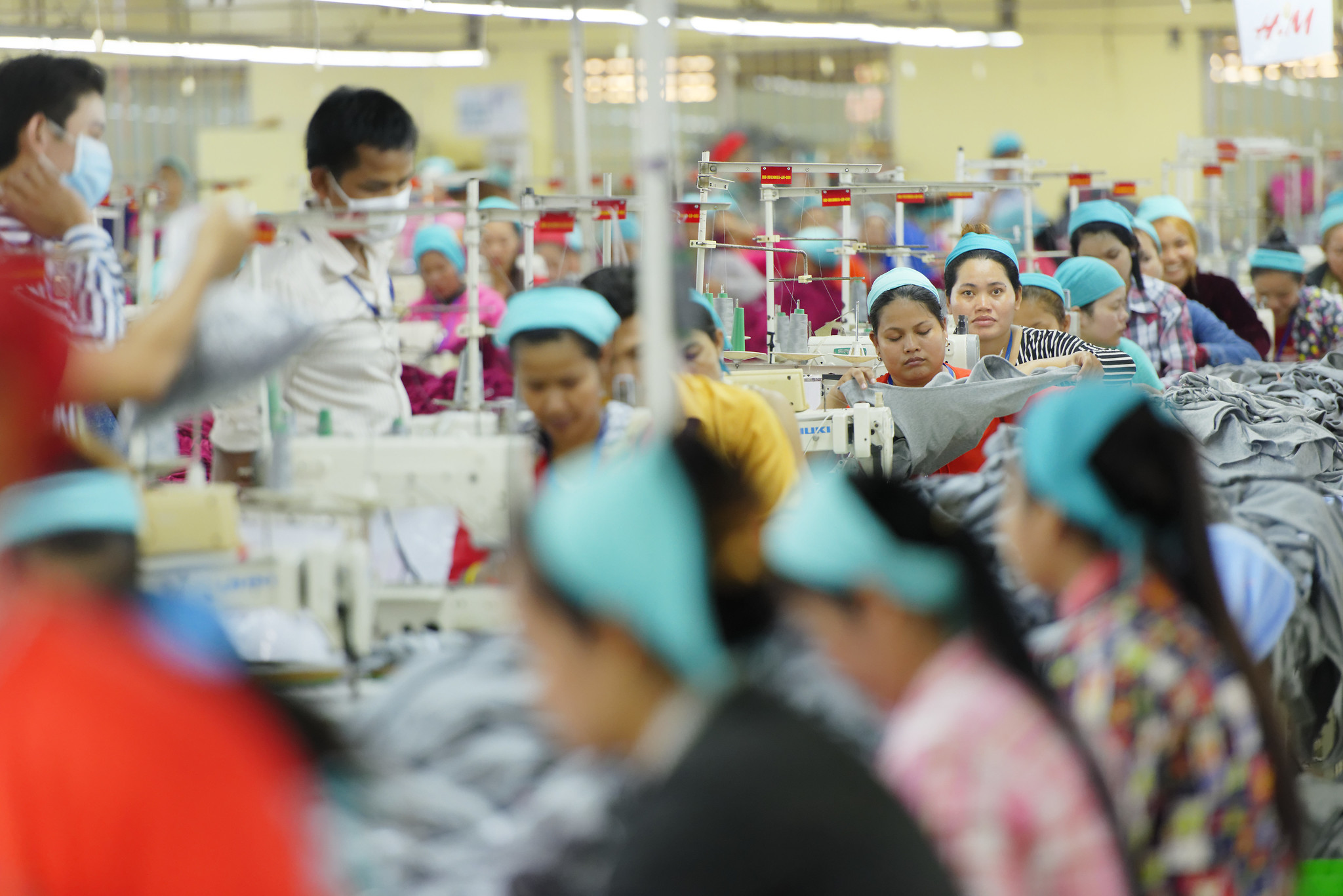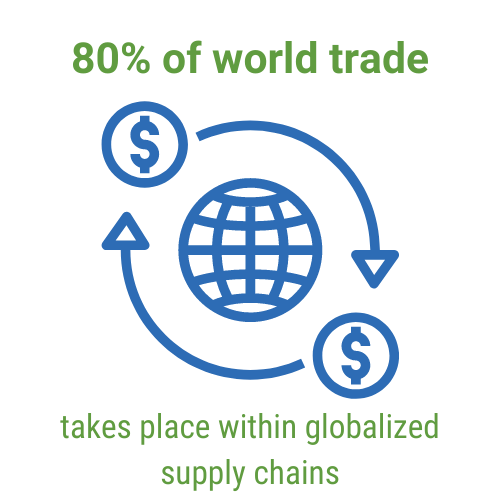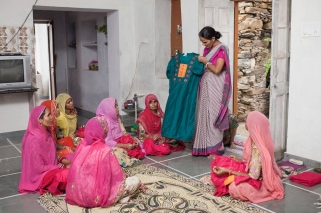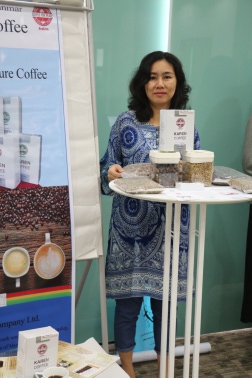Jul 27, 2021 | by Gillian Dowie & Bouba Housseini (IDRC)

Garment factory workers (International Labor Organization)
Eighty percent of world trade takes place within globalized supply chains — where different stages of a good’s production take place in different locations around the world. These global supply chains have been an important driver of economic growth and job creation in many countries in Asia. But challenges persist, particularly for women workers.

Global supply chains have been a major source of formal jobs for women, often accompanied by social security and reliable income. But recent research by the JustJobs Network in Myanmar, Thailand and Vietnam found that many industries such as garment manufacturing that rely on women workers mostly handle a limited number of low-skilled tasks, such as cutting and sewing. Economic upgrading, which is the progression into higher value and better paying activities, such as design, is still limited. For women workers, this means that the possibilities for learning and advancement remain low.
Researchers, journalists and activists regularly highlight that the quality of these jobs, mostly performed by women, can reinforce inequality. The challenges for women garment workers, for example, are well documented – from poor working conditions and low pay to harassment and abuse at work and few chances to advance.
The jobs in supply chains also extend to the informal economy, where millions of women in Asia earn a living as informal homebased workers, performing tasks ranging from cutting and sewing garments and bags to doing detailed embroidery and beadwork. These are workers who are hidden within the supply chain and perform their tasks in their homes without any guarantees of work, typically earning a very low piece rate with no access to social security or written contracts.
Jobs in supply chains depend on global economic prospects, so when the COVID-19 pandemic hit, these bottom-of-the-value-chain jobs were among the first to vanish. Lockdowns clearly limited work and increased vulnerability, particularly in countries where government support through social protection programs was low or non-existent. Even when factories came back online, they brought back smaller workforces because of reduced orders and the need for social distancing. The impact on informal workers was perhaps more severe. Homebased workers in South Asia reported a complete loss of income for the initial months of the lockdowns and a slow and uneven recovery. Many workers relied on borrowing and reported increased hunger.
Businesses have a pivotal role in building the resilience of women working in supply chains and their communities. Lessons from IDRC-supported research aiming to make supply chains work for women sheds light on what businesses can actually do to improve working conditions both inside factories and for informal homebased workers, as well as to increase supply chain access for women entrepreneurs.

Garment factory workers (International Labor Organization)
For example, Research led by the Tufts Labor Lab, with the University of Indonesia and Real-Time Analytics in Vietnam, studied the impact of the International Labour Organization and International Finance Corporation's Better Work program, designed to improve factory management practices and contribute to a more productive and competitive garment sector. The study found that garment factories adhering to this program, which provides advisory services and monitors implementation to improve working conditions, performed better than non-participating factories. Their management practices emphasized employee development and empowerment, more open communication, collective bargaining, and respect for workers’ rights, including minimum wage and parental leave.
Strengthened communication and improved access to information led to higher worker satisfaction and lower turnover in participating factories. For example, promotions based on performance as well as the exchange of information with management on pay structures were connected to lower job turnover. In fact, in Indonesia the simple use of a complaints box that management reads seemed to have a strong impact on worker satisfaction.
In the realm of informal work, a network organization of homebased worker collectives, HomeNet South Asia, led research demonstrating the critical role that social enterprises can play in connecting women’s collectives to supply chains. Social enterprises were found to either source their goods (clothing, bags, crafts and so on) from women’s producer collectives or to directly develop and coordinate producer collectives. They diversified the producer collectives’ income by supplying domestic and international brands and by setting up their own retail operations. They invested in skills training and quality control, and in some cases even organized village workspaces so women could come together, learn, and work outside the home, while being able to enforce certain health and safety standards on site. Women were able to come together, learn, and work outside the home, while being able to enforce certain health and safety standards on site.

Homebased workers (Homenet South Asia Trust)
The role of social enterprises and their innovative practices appeared to be highly supportive and potentially even transformative for homebased workers. Those workers who were connected to a social enterprise tended to have more regular earnings throughout the year. During the initial COVID-19 lockdowns, collectives and social enterprises were able to pivot more quickly to produce masks and other protective equipment, allowing workers to keep earning some portion of their income. Collective members were overall more visible, had more power and were more resilient than those workers who were not organized.
Beyond ensuring quality jobs, attention is also needed on women acting as suppliers and business leaders in the supply chain. Action research led by the Trade Facilitation Office, Canada and the Mekong Institute aimed to empower women-led small and medium enterprises (SMEs) in global supply chains. It demonstrated that targeted training and coaching activities for women-led SMEs are critical to improving their business practices and the quality of their products and to growing their businesses. The interventions they tested included training women entrepreneurs in market research skills, creating peer exchanges among women exporters, and connecting them with global markets.
As a result of these interventions, participants achieved greater knowledge of their business environments, more efficiency in their operations, and significant growth in their businesses and export sales. For example, Khin Ohmmar Moe, a woman entrepreneur running Karen Coffee, collaborated with a national think tank in Myanmar on a study assessing the economic potential of coffee in Chin and Kayin State. Moe presented the study and her experiences to policymakers and the Myanmar coffee association. Her efforts contributed to the government granting over 3000 acres of additional land to farmers for coffee production in Chin and neighbouring states, and to the development of a national plan to expand the coffee industry. Further, she expanded her network internationally and landed a contract to sell coffee in a leading Myanmar grocery chain[1]. This and other examples demonstrate clearly that women need more networking opportunities, better market access and support with business growth. This type of training and coaching model is a scalable way of ensuring women are better represented in supply chains.

Karen Coffee (Mekong Institute)
[1] This took place well before the military coup in Myanmar and the current status of this enterprise is unknown. It is critical to understand the broader operating environment for small enterprises, including issues of governance and fragility.
Transforming global supply chains into drivers of inclusion, resilience and social gains requires the entire ecosystem of actors along the chain to play a role.
The lessons from this body of research point to solutions that can be scaled to build stronger businesses and better, more resilient industries, and to create an avenue for businesses to promote gender equality in their operations.
Authors Gillian Dowie, Senior Program Officer, Sustainable Inclusive Economies, IDRC and Bouba Housseini, Program Officer, Sustainable Inclusive Economies, IDRC can be contact information can be found here.
Categories: Blog Womens Economic Empowerment Blog 2021 WebinarsBlogs

1621 North Kent Street, Ste 900,
Arlington, VA, 22209
P 202.534.1400
F 703.276.1433
Website Photos: © mari matsuri
